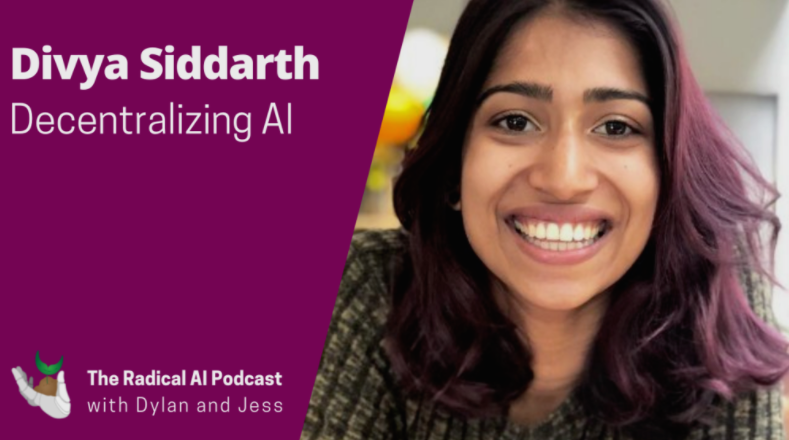
ΑΙhub.org
Radical AI podcast: featuring Divya Siddarth

Hosted by Dylan Doyle-Burke and Jessie J Smith, Radical AI is a podcast featuring the voices of the future in the field of artificial intelligence ethics. In this episode Jess and Dylan chat to Divya Siddarth about decentralizing AI.
Decentralizing AI with Divya Siddarth
What is decentralized AI and how and why should we design and implement it?
To answer this question and more in this episode we interview Divya Siddarth about decentralizing AI, democratization, and how we can utilize the logic of social movements to influence our technology design.
Divya Siddarth is a Political Economist and Social Technologist at the Microsoft Office of the CTO working to understand, preserve, and extend democracy through technological progress and innovation. She previously taught classes at Stanford University on building technology for good and creating a more secure world for political activism and engagement in civil society. Divya also spent a few years in India as a research fellow, working with activists and politicians to think through democratized alternatives to existing tech platforms.
Follow Divya Siddarth on Twitter @divyasiddarth.
Full show notes for this episode can be found at Radical AI.
Listen to the episode below:
About Radical AI:
Hosted by Dylan Doyle-Burke, a PhD student at the University of Denver, and Jessie J Smith, a PhD student at the University of Colorado Boulder, Radical AI is a podcast featuring the voices of the future in the field of Artificial Intelligence Ethics.
Radical AI lifts up people, ideas, and stories that represent the cutting edge in AI, philosophy, and machine learning. In a world where platforms far too often feature the status quo and the usual suspects, Radical AI is a breath of fresh air whose mission is “To create an engaging, professional, educational and accessible platform centering marginalized or otherwise radical voices in industry and the academy for dialogue, collaboration, and debate to co-create the field of Artificial Intelligence Ethics.”
Through interviews with rising stars and experts in the field we boldly engage with the topics that are transforming our world like bias, discrimination, identity, accessibility, privacy, and issues of morality.
To find more information regarding the project, including podcast episode transcripts and show notes, please visit Radical AI.









